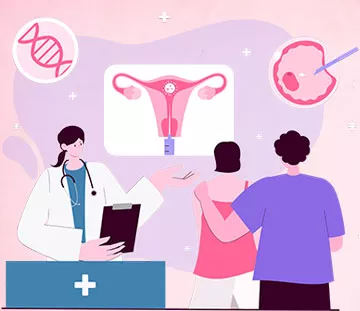IUI Treatment for Pregnancy
The journey to parenthood can look different for everyone, and for some, assisted reproductive techniques like IUI offers a promising path forward. Intrauterine insemination (IUI) is a fertility treatment that increases the chances of conception by placing sperm directly into the uterus, giving it a more direct path to the egg. This article covers the IUI process for pregnancy, including what to expect, how it works, and factors affecting success rates.
What is IUI and How Does It Work?
Intrauterine insemination (IUI) is one of the simplest forms of assisted reproductive technology. Unlike other methods, it is non-surgical and only involves the insertion of prepared sperm directly into the uterus around ovulation, increasing the chances that the sperm will reach and fertilize the egg. IUI is especially useful for:
- Couples with unexplained infertility
- Males with mild sperm abnormalities
- Females with cervical mucus issues that might interfere with sperm movement
By allowing a higher concentration of healthy sperm to be placed closer to the egg, IUI can help bypass certain fertility issues and improve the chances of pregnancy.
IUI Process for Pregnancy
The IUI procedure for pregnancy is straightforward and generally includes the following steps:
1. Initial Consultation and Screening
Before beginning IUI treatment, fertility specialists assess both partners’ health and fertility to ensure IUI is a suitable option.
2. Ovulation Induction
If the female partner has irregular ovulation, doctors may prescribe medication to stimulate the ovaries to release an egg. Hormone levels and follicle growth are closely monitored through blood tests and ultrasounds to determine the optimal timing for insemination.
3. Sperm Collection and Preparation
On the day of insemination, sperm is collected from the male partner or a donor. The sperm is then washed to concentrate healthy, mobile sperm while removing proteins and other elements that may hinder conception.
4. Insemination Procedure
During ovulation, the washed sperm is inserted into the uterus using a thin catheter. The procedure typically takes just a few minutes and does not require anesthesia.
5. Post-Procedure Care
Some women experience mild cramping or light spotting after the procedure. It is generally safe to resume normal activities on the same day.
| IUI Steps | Description |
|---|---|
| Ovulation Monitoring | Blood tests and ultrasounds track ovulation and determine the best time for insemination |
| Sperm Collection | Sperm sample collected and washed to isolate healthy sperm |
| Insemination | Sperm inserted via catheter directly into the uterus |
| Monitoring Post-Procedure | Normal activities can usually resume right away; a pregnancy test follows after 14 days |
IUI Success Rates and Factors Influencing Pregnancy
The success rate of IUI pregnancy can vary widely depending on factors such as the age and health of the female partner, sperm quality, and any underlying health issues. Generally, younger women and those with healthy reproductive systems have higher success rates with IUI.
Additional factors that can influence IUI pregnancy outcomes include:
- The overall health and age of the woman
- The quality and count of the sperm sample
- The number of cycles attempted (IUI may be tried 3 - 4 times)
Benefits and Risks of IUI Treatment for Pregnancy
IUI offers numerous benefits as a fertility treatment. It is minimally invasive and typically less expensive than other fertility treatments, such as in vitro fertilization (IVF). It is also useful for couples and individuals dealing with mild infertility issues or when donor sperm is used.
While generally safe, some risks are associated with IUI treatment for pregnancy, such as:
- Mild cramping or discomfort during or after the procedure
- Low risk of infection
- A small chance of multiple pregnancies if fertility medications are used to stimulate ovulation.
IUI Pregnancy Test: When and How to Test for Pregnancy After IUI
Testing for pregnancy after IUI can be exciting yet nerve-wracking. Doctors usually recommend waiting 14 days after the procedure to take a pregnancy test. Testing too early can lead to a false negative result, as the pregnancy hormone hCG may not be at detectable levels yet.
There are two main options for IUI pregnancy test methods:
1. Home Pregnancy Test – This can be done around two weeks post-IUI to give a preliminary indication.
2. Blood Test – A blood test at the clinic is often performed after two weeks to confirm pregnancy, as it gives more accurate results by measuring hCG levels precisely.
Is IUI Right for You?
Considering IUI requires assessing various personal and medical factors. Some of the key questions to ask yourself and your doctor include:
- Have previous fertility treatments or natural conception attempts been unsuccessful?
- Do you ovulate regularly, or will you need hormonal support?
- Are you prepared to try multiple IUI cycles if necessary?
Tips for Maximizing Success with IUI
To get the best possible outcomes with IUI treatment for pregnancy, follow these simple guidelines:
1. Choose the Right Timing
Scheduling IUI during ovulation maximizes chances of success, as this is when the egg is most receptive to fertilization. Regular monitoring of ovulation through ultrasound or ovulation kits can help pinpoint the ideal timing for the procedure.
2. Optimize Sperm Health
Encourage your partner to maintain optimal sperm health by avoiding tobacco, alcohol, and excessive heat exposure. A nutritious diet, regular exercise, and supplements like vitamin C and zinc can also improve sperm quality and mobility, enhancing the IUI outcome.
3. Consider Medication
Fertility medications may increase the chances of IUI success by stimulating ovulation and increasing the number of eggs available. Consult with your fertility specialist to see if medication is a good fit for your treatment plan.
4. Manage Stress
Reducing stress is essential, as high levels of cortisol can interfere with hormonal balance. Practices like meditation, yoga, and deep-breathing exercises can help relax the mind and body, creating a more supportive environment for conception.
5. Maintain a Healthy Weight
A healthy body weight contributes to balanced hormone levels, which play a crucial role in fertility. Underweight or overweight individuals may experience hormonal imbalances, so work with a healthcare provider to achieve a BMI within the optimal range for fertility.
6. Follow a Balanced Diet
A nutrient-dense diet rich in leafy greens, lean proteins, and whole grains supports hormonal health and enhances egg quality. Foods high in antioxidants, such as berries, nuts, and seeds, may also help improve overall reproductive health.
7. Limit Caffeine and Alcohol
Excessive caffeine and alcohol consumption can impact fertility, reducing the likelihood of success with IUI. Limiting caffeine intake and avoiding alcohol can support reproductive health.
8. Stay Hydrated
Proper hydration supports cervical mucus production, which helps sperm travel efficiently through the cervix.
9. Avoid Strenuous Exercise
While moderate exercise supports fertility, high-intensity workouts may cause hormonal imbalances. Choose gentle activities like walking or swimming to stay active without over-stressing the body.
10. Communicate with Your Doctor
Stay in close communication with your fertility specialist throughout the IUI process. Regular check-ups, adjustments to medications, and professional advice are key to optimizing your chances and adjusting the approach if needed.
Embarking on IUI and pregnancy can be a hopeful yet sometimes challenging experience. With a relatively simple procedure, manageable risks, and the support of a qualified fertility specialist , IUI offers a valuable route for many couples and individuals on their path to parenthood. If you’re ready to explore IUI treatment for pregnancy, visit your nearest Indira IVF centre to discuss your options and take the next steps on your journey.
Pregnancy Calculator Tools for Confident and Stress-Free Pregnancy Planning
Get quick understanding of your fertility cycle and accordingly make a schedule to track it















